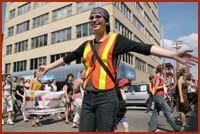Flash your tits — the Dyke March is back.
The 2007 march will take a very different route than the Pride Parade. It will begin at the Human Rights Monument (Elgin and Lisgar) at 2pm. Organizers plan to march up Elgin to Laurier, along Laurier to Bank, through the gaybourhood to Gladstone, and then back up Gladstone and around the corner on Elgin, finishing up at the Jack Purcell Community Centre.
Ariel Troster, Ottawa activist and writer is one of the organizers for the fourth annual Ottawa Dyke March. She sees it as being a vital fixture in Pride week.
“The Dyke March is a really important opportunity for queer women to take up space in the streets of Ottawa, stand in solidarity with each other, celebrate our families, smooch our lovers, and demonstrate that we won’t stand for misogyny, heterosexism, homophobia and transphobia. It’s an opportunity for women to participate in a grassroots initiative that celebrates how proud we are to be lesbian, bisexual, queer and trans women.”
Like many dyke marches worldwide, the Ottawa event welcomes all women-identified people and invites men to cheer from the sidelines. Some may wonder at the division implied by the Dyke March, but Troster explains that the Pride Parade and the Dyke March are both valuable events in the Ottawa community, essentially serving different purposes.
“While the Pride Parade is an excellent opportunity to bring all of the members of the queer and trans community together, the Dyke March is a great opportunity to celebrate our lives, accomplishments and struggles with other women.”
Lesbians and trans women face unique challenges in their day-to-day lives, some of which the rest of the queer community can’t always relate to.
“Women still face discrimination in the workplace and violence at home,” Troster explains. “We live in an image-obsessed culture that scrutinizes our bodies and encourages us to starve ourselves. We still get heckled by men on the street. Trans women in particular face significant discrimination and face the daily threat of violence. Our voices are often marginalized in mainstream culture and we face many layers of oppression — sexism, heterosexism, misogyny, poverty, homophobia, transphobia, racism. But when we get together and take to the streets, we show that we aren’t going to take it anymore! We create a space for women to network and support each other. And it’s always a lot of fun.”
With a political edge that comes naturally to her, Troster explains that the Dyke March needs to have a permanent place in the capital city’s Pride calendar because it reminds the government about important issues that will not be forgotten by the queer community.
“We are living in a city governed by a rightwing mayor who just recently cut funding to the crack pipe program in Ottawa. He has made it very clear that he doesn’t understand the struggles of marginalized people in our communities. And this year, Prime Minister Stephen Harper cut funding to Status Of Women Canada and the Court Challenges program. Ottawa is a political city. The Dyke March is a chance to give queer women’s issues a national profile.”
Like many Pride events, the Dyke March has many layers of significance for the Ottawa community. Having plowed through discrimination and challenges, participants cannot forget all they’ve encountered along the way. On the other hand, the Dyke March is a celebration — a moment seized to revel in the beauty of diversity — and perhaps catch the attention of that cutie you’ve been eyeing all year.
Afternoon festivities following the march include a free barbecue and a family-friendly variety show at the Jack Purcell Park. Everyone — family, friends, pets and kids — is invited. Come enjoy the summer skies, cheer on your fellow dyke marchers, make out and celebrate your families.

 Why you can trust Xtra
Why you can trust Xtra


